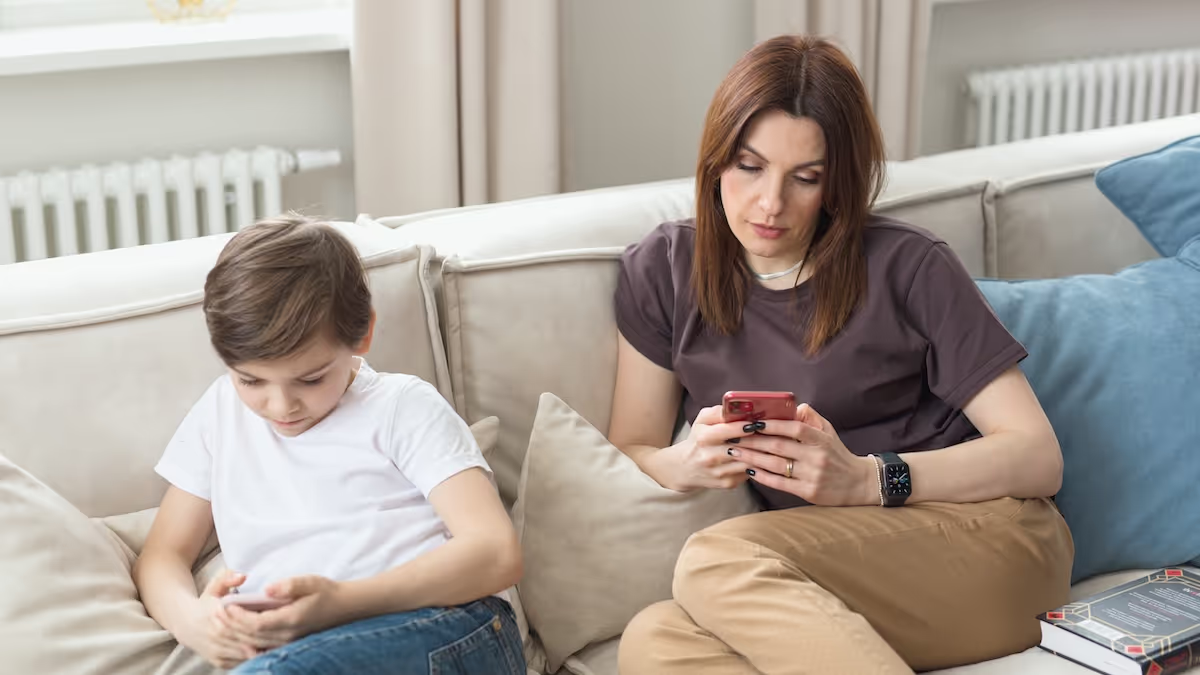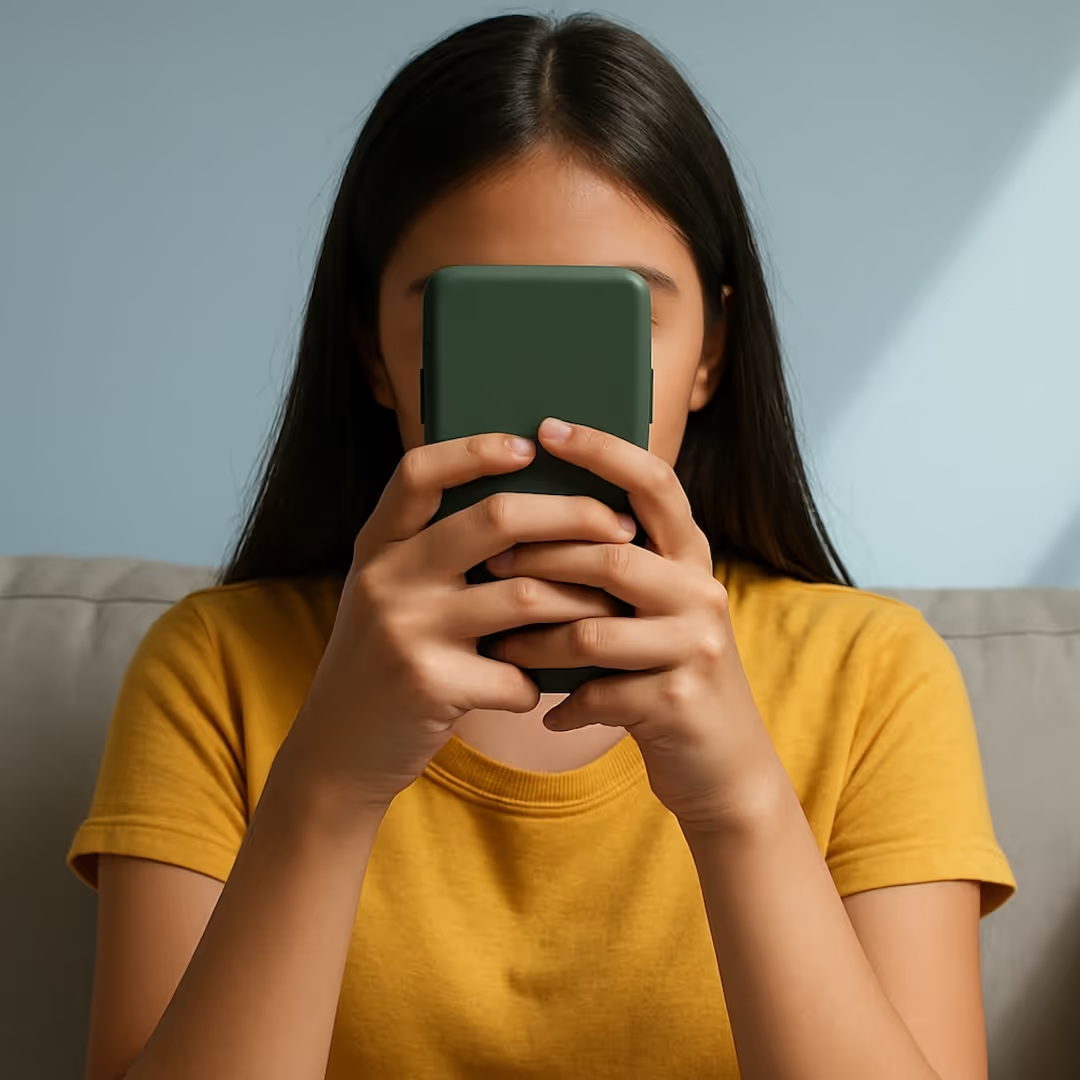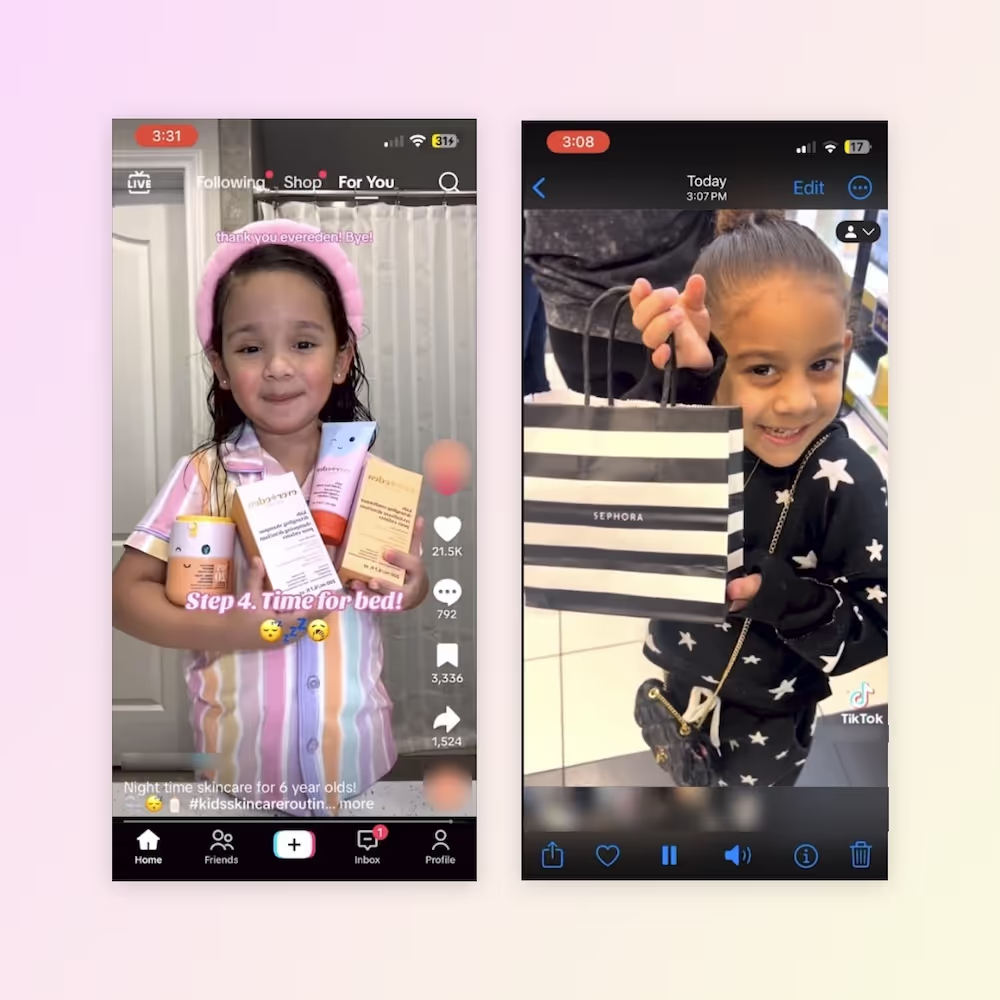


I hear from many parents who feel conflicted about their own phone habits when it comes to modeling healthy use for their kids.
They’ll say, “I tell my kids to get off their screens, but then I’m on mine all the time.”
Given that we all carry around these powerful mini computers/entertainment centers, it makes perfect sense that this is a common struggle.
Today, I want to focus on one specific, and honestly awesome, modeling strategy: showing kids that we’re aware of our own screen habits, and bringing them along as we work to change those habits.
As I write this, I can't help but think of this wonderful quote from Albert Camus:
“It takes time to live. Like any work of art, life needs to be thought about.”
In the latest episode of the Parenting in the Screen Age podcast, two moms join me to talk about one phone habit each of them wants to break.
Hillary realized that when she pulls into her garage, she often sits in her car scrolling social media for far too long, and her teen knows it
Tory, meanwhile, finds herself frequently checking her phone, often for work-related reasons, while spending time with her kids.
I invited both of them to take part in what I call the One Small Change Challenge, using the DARTS framework. In the podcast you’ll hear each of them making a plan based on the following steps:
Learn more about showing our movies in your school or community!
Join Screenagers filmmaker Delaney Ruston MD for our latest Podcast

Learn more about our Screen-Free Sleep campaign at the website!
Our movie made for parents and educators of younger kids
Learn more about showing our movies in your school or community!
It would be wonderful to pause for a moment, think about your own phone habits, and take the One Small Change Challenge yourself.
Plan to do it for two weeks and consider inviting a friend or family member to join you. It’s far more fun and motivating when someone is on the journey with you.
Also, if you have kids, it’s a great opportunity to role model by letting them know what you are doing and why. You could even ask them to be your support (the S in DARTS).
They’ll appreciate that for once the focus isn’t on their screen use, but on yours. When we take a moment to reflect on our habits, we’re not just putting down our phones; we’re making space for the art of living.
I’d love to hear from you if you do take the challenge. Let me know how you get on at delaney@screenagersmovie.com
Tune in to the podcast to hear about the small target goals Hillary and Tori chose and how I helped them make their plans using DARTS. In a few weeks, they’ll be back to share how it went, what worked, what didn’t, and what they learned.
Learn more about showing our movies in your school or community!
Join Screenagers filmmaker Delaney Ruston MD for our latest Podcast

Learn more about our Screen-Free Sleep campaign at the website!
Our movie made for parents and educators of younger kids
Join Screenagers filmmaker Delaney Ruston MD for our latest Podcast
Subscribe to our YouTube Channel! We add new videos regularly and you'll find over 100 videos covering parenting advice, guidance, podcasts, movie clips and more. Here's our most recent:
As we’re about to celebrate 10 years of Screenagers, we want to hear what’s been most helpful and what you’d like to see next.
Please click here to share your thoughts with us in our community survey. It only takes 5–10 minutes, and everyone who completes it will be entered to win one of five $50 Amazon vouchers.
I hear from many parents who feel conflicted about their own phone habits when it comes to modeling healthy use for their kids.
They’ll say, “I tell my kids to get off their screens, but then I’m on mine all the time.”
Given that we all carry around these powerful mini computers/entertainment centers, it makes perfect sense that this is a common struggle.
Today, I want to focus on one specific, and honestly awesome, modeling strategy: showing kids that we’re aware of our own screen habits, and bringing them along as we work to change those habits.
As I write this, I can't help but think of this wonderful quote from Albert Camus:
“It takes time to live. Like any work of art, life needs to be thought about.”
In the latest episode of the Parenting in the Screen Age podcast, two moms join me to talk about one phone habit each of them wants to break.
Hillary realized that when she pulls into her garage, she often sits in her car scrolling social media for far too long, and her teen knows it
Tory, meanwhile, finds herself frequently checking her phone, often for work-related reasons, while spending time with her kids.
I invited both of them to take part in what I call the One Small Change Challenge, using the DARTS framework. In the podcast you’ll hear each of them making a plan based on the following steps:
It would be wonderful to pause for a moment, think about your own phone habits, and take the One Small Change Challenge yourself.
Plan to do it for two weeks and consider inviting a friend or family member to join you. It’s far more fun and motivating when someone is on the journey with you.
Also, if you have kids, it’s a great opportunity to role model by letting them know what you are doing and why. You could even ask them to be your support (the S in DARTS).
They’ll appreciate that for once the focus isn’t on their screen use, but on yours. When we take a moment to reflect on our habits, we’re not just putting down our phones; we’re making space for the art of living.
I’d love to hear from you if you do take the challenge. Let me know how you get on at delaney@screenagersmovie.com
Tune in to the podcast to hear about the small target goals Hillary and Tori chose and how I helped them make their plans using DARTS. In a few weeks, they’ll be back to share how it went, what worked, what didn’t, and what they learned.
Subscribe to our YouTube Channel! We add new videos regularly and you'll find over 100 videos covering parenting advice, guidance, podcasts, movie clips and more. Here's our most recent:
Sign up here to receive the weekly Tech Talk Tuesdays newsletter from Screenagers filmmaker Delaney Ruston MD.
We respect your privacy.
I hear from many parents who feel conflicted about their own phone habits when it comes to modeling healthy use for their kids.
They’ll say, “I tell my kids to get off their screens, but then I’m on mine all the time.”
Given that we all carry around these powerful mini computers/entertainment centers, it makes perfect sense that this is a common struggle.
Today, I want to focus on one specific, and honestly awesome, modeling strategy: showing kids that we’re aware of our own screen habits, and bringing them along as we work to change those habits.
As I write this, I can't help but think of this wonderful quote from Albert Camus:
“It takes time to live. Like any work of art, life needs to be thought about.”
In the latest episode of the Parenting in the Screen Age podcast, two moms join me to talk about one phone habit each of them wants to break.
Hillary realized that when she pulls into her garage, she often sits in her car scrolling social media for far too long, and her teen knows it
Tory, meanwhile, finds herself frequently checking her phone, often for work-related reasons, while spending time with her kids.
I invited both of them to take part in what I call the One Small Change Challenge, using the DARTS framework. In the podcast you’ll hear each of them making a plan based on the following steps:

It feels like we’re finally hitting a tipping point. The harms from social media in young people’s lives have been building for far too long, and bold solutions can’t wait any longer. That’s why what just happened in Australia is extremely exciting. Their new nationwide move marks one of the biggest attempts yet to protect kids online. And as we released a new podcast episode yesterday featuring a mother who lost her 14-year-old son after a tragic connection made through social media, I couldn’t help but think: this is exactly the kind of real-world action families have been desperate for. In today’s blog, I share five key things to understand about what Australia is doing because it’s big, it’s controversial, and it might just spark global change.
READ MORE >
This week’s blog explores how influencers and social media promoting so-called “Healthy” ideals — from food rules to fitness fads — can quietly lead young people toward disordered eating. Featuring insights from Dr. Jennifer Gaudiani, a leading expert on eating disorders, we unpack how to spot harmful messages and start honest conversations with kids about wellness, body image, and what “healthy” really means.
READ MORE >
A growing concern I have is how young girls, some as young as 7 or 8, are becoming fixated on beauty products. In Screenagers Elementary School Age Edition, we show clips of elementary-aged girls talking excitedly about their favorite skin and makeup items. In today's blog I look at how this beauty obsession is reaching younger ages, fueled by pervasive beauty ideals on social media.
READ MORE >for more like this, DR. DELANEY RUSTON'S NEW BOOK, PARENTING IN THE SCREEN AGE, IS THE DEFINITIVE GUIDE FOR TODAY’S PARENTS. WITH INSIGHTS ON SCREEN TIME FROM RESEARCHERS, INPUT FROM KIDS & TEENS, THIS BOOK IS PACKED WITH SOLUTIONS FOR HOW TO START AND SUSTAIN PRODUCTIVE FAMILY TALKS ABOUT TECHNOLOGY AND IT’S IMPACT ON OUR MENTAL WELLBEING.
